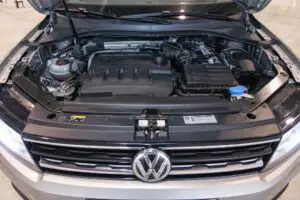When an engine can produce more than 200 HP without any modifications, you can tell that it is a good one.
Well, that is the case with the 3.0 TDI engine from Volkswagen and Audi, which can output 205 HP and a very impressive 332 lb. ft of torque.
Although the engine is quite reliable, there are some issues that users face while driving it.
Let me outline the common VW and Audi 3.0 TDI engine problems before I continue:
- Fuel Injector Issues
- DPF Failure
- Faulty Timing Chain Tensioner
- Fuel Pump Issues
- Clogged Heater Core
As you can see, all of the mentioned problems are quite serious ones, and this article will focus on all of them, including possible repair options.
So, without any further ado, let’s get straight into it!
Table of Contents
- 1 The 5 Most Common VW/Audi 3.0 TDI Diesel Engine Problems
- 2 What Is The Volkswagen/Audi 3.0 TDI Engine?
- 3 Is The Volkswagen/Audi 3.0 TDI Engine Reliable?
- 4 What Cars Use The Volkswagen/Audi 3.0 TDI Engine?
- 5 Volkswagen/Audi 3.0 TDI Engine Specs
- 6 The Benefits Of Choosing The Volkswagen/Audi 3.0 TDI Engine
- 7 Frequently Asked Questions
- 8 Conclusion
The 5 Most Common VW/Audi 3.0 TDI Diesel Engine Problems

This article will now solely focus on the five issues that were written above.
It would be better to read this section without skipping anything, as there is much important information here.
1. Fuel Injector Issues
In the first problem of this article, I will be talking about the fuel injector of the 3.0L TDI engine.
Let me explain to you the function of this part. The Audi engine uses a rail direct injection system.
The difference between this and normal direct injection is that a considerable amount of pressure is used, which allows the engine to perform better.
The Issue
So, what could cause the fuel injectors to fail? Well, the one main cause is wearing and tearing.
Yes, that’s right! I don’t know if you were aware, but wear and tear affect almost every engine part. Unfortunately, fuel injectors are one of those.
They can also get clogged over time, but the more likely reason is the high working temperature and the pressure they need to spray to meet the engine’s demands.
Symptoms
Now, the question arises, what could happen if any of the issues mentioned above were to happen to the engine’s fuel injector?
Well, you can run into various issues, and let me list down some symptoms which can occur when the injector causes issues.
- Unexpected misfires.
- Sudden power loss.
- Engine leaking gasoline.
- Degraded performance.
All of these symptoms suggest that there is a serious issue going on in the engine. You can use these indications to rule out other possibilities.
Repair
So, you have finally figured out that the Audi engine has a fuel injector issue but don’t know how to proceed further.
Well, to ensure your safety and the people around you, it is best to avoid driving the vehicle altogether.
You should get it towed to the nearest mechanic. The injectors may need to be replaced, especially if the vehicle has been driven more than 100000 miles.
You could replace them yourself, but the procedure should only be performed by people who have prior experience.
2. DPF Failure
There are many parts of the engine, some of which people are oblivious about. One of those parts is the DPF, or more commonly known as the Diesel Particulate Filter.
The DPF has a simple function on the Audi diesel 3.0; it reduces the vehicle’s emissions by ensuring that any particulates present in the diesel are not let through.
Source Of The Problem
I think it is clear that the DPF has a vital role in the engine’s functioning and makes sure that all emission rules and regulations are obeyed. So, what could go wrong with this part?
Well, as it is a filter, there is always a chance for it to get clogged. There can be carbon deposits, which can grow over time and cause the entire filter to be blocked.
Identifying The Problem
There are many different things you can observe to confirm if the DPF of the engine is causing issues.
The most common symptoms are:
- Turning on the DPF light on the dashboard.
- Reduced performance.
- Poor fuel efficiency.
- Engine emitting a strange smell.
These symptoms normally happen at once when the DPF has reached the point of blockage. They confirm that there is indeed a build-up, which needs to be cleared immediately.
Fixing The Issue
There are many different approaches to fixing the issue.
Before you head down to the nearest workshop, it is advised to drive the vehicle at a high RPM and a high speed for at least 15 minutes.
This will allow some of the soot to burn off, which will allow the engine to breathe better.
If you want a more permanent solution, then you can either get a new filter, get it professionally cleaned, or deleted it entirely.
The last option is not recommended as it may land you in trouble with the authorities.
3. Faulty Timing Chain Tensioner
Function
The Audi diesel 3.0 was in production for nine years, from 2004 to 2013.
There were a few issues that were exclusive to the earlier versions of the engine, such as the sudden and unexpected failure of the timing chain tensioner.
The function of the tensioner is to make sure that the timing belt has the right tension at all times.
As the belt needs to control the timing of various parts of the engine, such as the pump and the camshaft, its tension needs to be spot on, or else you will run into many different issues.
The Problem
The manufacturer did make some changes in the engine throughout the years.
One big difference between the old ones and the new is that the old one has only two-timing chains instead of four, like in the new ones.
This means that they have to work harder. So, there is definitely a chance of them failing unexpectedly.
The tensioners could fail due to wear and tear. When it is unable to keep the chain in check, you can run into issues such as sudden engine shut off.
This issue can cause catastrophic damage to the engine, which, in a worst-case scenario, would result in a whole rebuild.
Identification And Repair
When the timing chain is unable to work properly due to not there being proper tension, there are many symptoms that will emerge.
You can use these symptoms to catch the issue as soon as possible.
They are:
- Unexpected engine stall.
- Difficulty starting the vehicle.
- The rattling of the timing chain.
Although the first two symptoms can be caused by various reasons, the third one confirms that there is a loose timing chain in the engine.
The only thing you can do is replace the entire tensioner. The job will set you back a few thousand dollars, but that is the only way you can get your engine back in usable condition.
4. Fuel Pump Issues
The VW 3.0 TDI engine uses an HPFP, or more commonly known as the High-Pressure Fuel Pump.
This pump is essential for the engine’s working. They have only one job, and that is to push the fuel, at full pressure, to the injectors.
Possible Issues
You really don’t want this pump to fail on the 3.0 engine. You can have many serious issues.
Some users reported that a faulty pump could send out small pieces of metal in the fuel system.
This will cause catastrophic damage, which will require thousands of dollars’ worth of repair. You may be asking how it could be possible for any metal fragments to end up in the pump.
Well, the cause of the issue is the pump itself. It could break from the inside, or the valve, which is attached to the pump, could break.
Both of them will result in small metal pieces entering the fuel system.
Symptoms
There are many symptoms that are associated with the failure of the HPFP.
The common ones are:
- The engine loses pressure.
- Engine producing a P0087 error code.
- The engine has an unusually high temperature.
- Degraded overall performance.
These symptoms confirm that the 3.0 engine has had a pump failure.
Repair and Precautions
If you have confirmed that the pump is indeed failing, you should not drive the car at all.
The more those fragments circulate the system, the more damage there will be. In the case of this issue, Volkswagen did issue extended warranties.
Hopefully, if your vehicle is still covered, then you can get the issue fixed without spending anything. If not, then you are looking at an expensive repair.
A simple failure could cost you up to $2000. Finding all the metal parts can add up an excess of $10000.
That is a steep price, but it is the only way to ensure your engine will be back in usable condition.
5. Clogged Heater Core
The final problem of this article has finally arrived. A few users complained that the heater core of the engine would stop working.
Now, before I discuss this issue any further, I must tell you that it has the lowest chance, out of all four, of happening.
Plus, if you already live in a hot environment, then you should not have to worry too much.
The Issue
If you live in a colder area, then you definitely need to read this section completely.
The heater core is responsible for generating the heat. You could say it is a radiator as it is the one that keeps the vehicle warm.
Regardless, there are two reasons which can cause the heater core to fail:
- The core is clogged.
- There is a leak.
Yes, both are possible, and both can cause issues with the heating functionality of the vehicle.
Diagnosing The Problem
So, what can be done to confirm that the core is clogged?
Fortunately, there are some symptoms that can be used to confirm the presence of the issue.
The coolant levels could be low, which could indicate a leak, or the A/C would simply not heat up the cabin.
Although there could be many other reasons for these symptoms, there is a possibility of the core causing issues. So, you should definitely keep that in mind.
Repair
In case there is a leak, you need to get the vehicle checked and get the leak fixed as soon as possible.
You should also recheck the coolant level and refill it if needed. Other than that, if there is a blockage in the core, you should get it flushed out.
This procedure normally fixes the problem, but if it does not, then you are looking at a full-on replacement, which will cost you a lot.
What Is The Volkswagen/Audi 3.0 TDI Engine?
Announced and made available to the general public in 2004, the 3.0 TDI engine was available in the market for nine years.
It was not used for a long time, but it certainly impressed many people.
With the engine being able to output more than 200 HP and 300 ft. lb of torque without any modifications, anybody would love it.
The interesting thing about this engine is that Audi designed it from scratch. There were no similarities to the previous releases, which made it more popular.
Is The Volkswagen/Audi 3.0 TDI Engine Reliable?
This answer can be divided into a yes and a no. A yes can be said because apart from the above five issues, there were none other that caused users frustration.
Most users did state that the engine always required work before reaching the first 100000 miles. And that answers my no to the main question.
What I can say is that if you keep the engine maintained at all times, then you will have a very pleasant driving experience, giving that you don’t run into any problems.
What Cars Use The Volkswagen/Audi 3.0 TDI Engine?
Not many vehicles were chosen to get this beast of an engine.
There were three manufacturers that used this engine. On the Volkswagen side, the Phaeton and the Touareg were the chosen ones.
The second manufacturer is Audi. Audi used this engine in the B7 and B8 A4, the Q7, THE C6 A6, and the D3 A8.
The fact that this company utilized the engine the most is the reason it is often called the Audi diesel 3.0. The final vehicle to feature this engine under its hood was the Porsche Cayenne.
Volkswagen/Audi 3.0 TDI Engine Specs
| Cylinder block material | Cast iron |
| Cylinder head material | Aluminum only |
| Type of fuel | Diesel driven |
| Injection category | Common rail direct fuel injection |
| Arrangement | V |
| No. of cylinders | 6 |
| No. of valves in each cylinder | 4 |
| Valvetrain design | DOHC |
| Bore | 83mm or 3.27-inches |
| Stroke | 91.4mm or 3.58-inches |
| Total displacement | 2967 |
| Combustion type | Turbocharged, Four stroke |
| Compression | 17.0:1 |
| Power/HP | 204 -245 @ 3500 – 4500 rpm |
| Torque/ft. lb | 332 – 406/ 1400 rpm |
| Oil weight | SAE 5W-30, 5W-40 |
| Oil capacity | 9.5quarts w/filter |
| Firing order | 1-4-3-6-2-5 |
| Time between oil change | 10000-miles (16000 km) or 2-months |
The Benefits Of Choosing The Volkswagen/Audi 3.0 TDI Engine
I think it is safe to say that there is more than enough information for you to decide if the engine is worth it or not.
You should definitely consider these pros of the engine too:
- The sound of the engine is quite as compared to other diesel engines.
- The oil change interval is one year, which means you can refill and forget.
- The fuel consumption of the engine is exceptionally solid.
- All of the above issues have a very low chance of occurring.
- Later variants of the engine had most of the issues fixed.
Frequently Asked Questions
Q1. How Long Can The 3.0 TDI Engine Last?
The engine can easily last 300000 miles. Many of you may be satisfied with this, but I have more good news.
There have been reports of users who were able to cross the 500000-mile mark with this engine.
This is very impressive. But if you are aiming to get a similar result, you need to make sure that the engine is maintained at all times and all issues are fixed as soon as possible.
Q2. Is The 3.0 TDI Better Than The 2.5L TDI Audi Engine?
Now, this is an interesting question. I can say, with full assurance, that the 3.0L engine is better than the other one in all departments except for the fuel efficiency one.
Due to the engine having a higher capacity, the fuel consumption is more. Other than that, everything is better on the bigger brother.
Q3. Why Are Volkswagen TDI Engines So Cheap?
The reason for this is that the TDI line-up’s manufacturing was stopped in 2015. There were cases against software that allowed the engine to reduce emissions illegally.
Plus, in 2021, gas-driven and electric vehicles are popular as ever, which leaves diesel-run engines in the dust.
Conclusion
If you managed to read through this article, then I think there is no doubt that you are serious about purchasing the engine.
Although there are a few VW 3.0 TDI engine problems, they should not worry you. I found out, after extensive research, that these issues have a pretty low chance of occurring.
But, on the off chance they do occur, you will probably have to spend a lot to fix the engine.
Regardless, I honestly think you should go ahead and purchase this engine. The 3.0L engine will surely give you a memorable driving experience. After all, it is a Volkswagen engine!
Resources:
1. https://vwtuning.co/vw-audi-30-tdi-engine-problems/
2. https://www.motorreviewer.com/engine.php?engine_id=91

I am Tahir Azam, and I have been writing amazing articles for TaxiHack for as long as I can remember. I know everything that is to know when it comes to automobiles and is always on top of industry news and developments. While I am not an expert by any means, I pride myself on knowing the ins and outs of many different problems and, of course, their solutions. The articles on our website are some of the best and well-researched content that you will find, and I spend countless hours making sure this remains to be true. This is why I ask you to take your time out and read some of my articles, especially if you find a topic that resonates with you or is something you are looking into. This way, you will find the perfect mix of information and tips on your desired topic. Learn more about Tahir.

